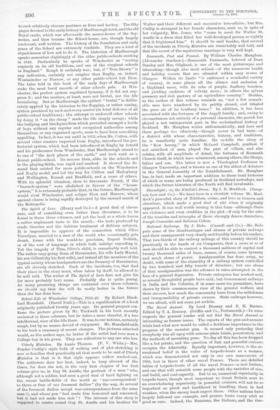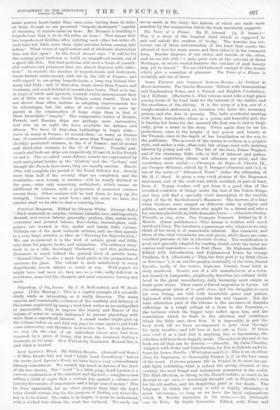mans possess boats faster than ours, some having done 32
miles an hour, though we are promised " torpedo-destroyers " capable of steaming 31 statute miles an hour. Mr. Norman is building a torpedo-boat that is to do 34} miles an hour ! This means that two torpedo-boat flotillas, after sighting each other ten miles off, need take but little more than eight minutes before coming into action ! What vistas of rapid action and of wholesale destruction does not this open ? As the Naval Annual says "It will be for
the coming great tactician to build up magnificent results out of a speed like this. But that tactician will need a brain of remark- able coolness and judgment that can almost dispense with reflec- tion." As regards the number of torpedo-boats and destroyers, Great Britain ranks second, with 180 to the 229 of France ; and with regard to sea-going torpedo-boats, a long way behind Ger- many and Italy ; and in first. class boats, lower than France and Germany, and much behind in second-class boats. That is to say, in boats of 100 ft. and upwards, beneath which measurement they are of little use at sea, Great Britain comes fourth. That we are slower than other nations in adopting improvements has its advantages, but the value of such caution is more ap- parent in the construction of large ships than in that of these formidable "insects." The comparative tables of British, French, and Russian ships are perhaps more instructive, and sum up at sight the force available for defence and offence. We have 35 first-class battleships to begin with,— t wice as many as France ; 13 second-class,—as many as France has ; 18 armoured cruisers—rather more than France has ; 13 (15 shortly) protected cruisers, to the 9 of France ; and 54 second and third-class cruisers, to the 19 of France. Torpedo gun- vessels and look-out ships are respectively 32 and 19, to the French 13 and G. The so-called coast-defence vessels are represented by such antiquated kettles as the Glatton' and the Cyclops,' and though the French have more, they are equally ancient. March, 1894, will complete the period of the Naval Defence Act; already more than half of the seventy ships are completed, and the remainder—over twenty in number—will be nearly finished in the year,—nine only remaining unfinished ; which means an additional 30 cruisers, with a proportion of protected cruisers among them. Other cruisers will be laid down to keep up the strength. Cruisers we must have ; and the more wo have, the quicker shall we be able to deal a crushing blow.



















































 Previous page
Previous page